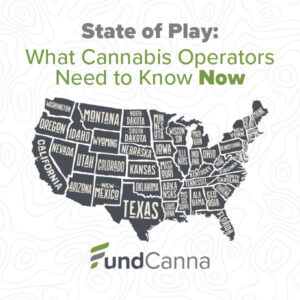FundCanna COO Eric Kaufman recently joined the National Cannabis Industry Association's Banking & Financial Services Committee for Part 1 of their #IndustryEssentials webinar series where they provided invaluable insights into the transformative implications of rescheduling cannabis to a Schedule III drug and its consequent impact on Section 280E of the Internal Revenue Code.

Full Transcript:
Moderated by: Naomi Granger, National Association of Cannabis Accounting & Tax Professionals

Thank you so much for having me happy to be here. I wanna just start off with giving a brief introduction of all of our panelists. And so we can start with Steven. I'm just gonna go in the order of the pictures on my screen. Steven, if you can just introduce yourself what your firm does and your areas of expertise.

Hi, thank you for allowing me to join. My name is Steven Gotsdiner. I'm a senior director in the Cannabis Solutions group of HBK CPA's and consultants. Our group focuses predominantly on cannabis companies, either hemp or marijuana and predominantly marijuana.
We do all things re that a CPA firm provides accounting work, a test work, due diligence, quality of earnings, tax planning, tax consulting. tax preparation and valuation work.

Awesome. Thank you so much. Let's move on to Neil. Can you please introduce what your firm does and your areas of expertise.

Oh, thanks, Naomi. Neil Rosenfield. I'm based out of Los Angeles. I'm with Bakertilly. We are the largest national CPA firm in currently serving clients in the space I work with clients all the way from you know from beginning to end. It's call it broke.
We work with MSO's. I work with private investors, startups, etc. and Steven just list whatever Steven just said about what he does, we do the same thing. So I'm the cannabis. Texas practice lead, and we offer an array full array of services to the cannabis industry.

Awesome. Thank you so much, Eric. Please introduce yourself in your areas of expertise.

Thanks, Naomi. Well, 1st let me let me thank Brian and Aaron from NCIA for putting this together, and Naomi you for for moderating. I do. Wanna call out from the poll that 100% joined this from for knowledge building, but only 7% joined it for the Speaker lineup, so none of us take it personally. But I think it should be acknowledged on, and one person joined because their boss made them so. So thanks for that. in any event, Eric Kaufman COO FundCanna.
FundCanna for those that don't know as a leading lender to the cannabis industry and the supply chain. We assist by providing products such as working capital vendor, financing, factoring, equipment, financing, and really try to put together a suite of products that are flexible, reliable, renewable, and customizable.
Specific to cannabis. We've underwritten over 2,500 cannabis businesses approve more than a quarter 1 billion dollars to the industry across all verticals in 40 States. Prior to FundCanna, the the leadership team has put out over 20 billion dollars on balance sheet to underserved businesses and individuals across the country.
One of the things we really try to do is ingratiate ourselves to the industry, and we do that by forming strategic partnerships with complementary businesses, so that we can all meet our customers where they're at. And we've done that with companies such as Distru, standardC, Green Check Verified, Dama financial. But we're also very proud of the partnership we have with the NCIA.

Awesome. Thank you so much. Aaron, can you please introduce yourself?

Yeah, thanks, Naomi. I'm Aaron Smith, the CEO and co-founder of NCIA the National Cannabis Industry Association. Since 2,010 we have been lobbying Congress and the Federal Government on Federal policy reform specifically on behalf of independent and small cannabis businesses, making sure that as the rules of legalization and regulation at Federal level are being written.
There's a seat at the table for for us, for independent businesses, and that this isn't going to be, you know, all swept up under big alcohol, big tobacco, and and also making sure that there's there's a voice beyond just the top few MSO's that can hire their own lobbyists.
We're really making sure that we're stronger through our collective voice than than we would be individually. So you know, really. Wanna thank all of the members on the call or on the webinar here. That 57 that aren't members look forward to talking to you and most importantly, thanks to all the the panelists that are gonna share your knowledge today.

Awesome. Thank you so much. And lastly, I'd just like to introduce myself. I will serve as your moderator. My name is Naomi Granger. I'm a CPA and MBA. And I serve as the treasurer on the board of the National Cannabis Industry Association. I'm also the CEO and founder of the National Association of Cannabis, Accounting and Tax Professionals. I work specifically with social equity operators and small startup operators as their accounting professional in the cannabis industry. I also provide training and education to other accountants who want to get started and build a book of business in this industry.
So happy to be here, and we are going to just kick this off with Erin, our CEO and co-founder, just to give us an overview, a lay of the land of what's going on. What does this mean? What does it not mean? With this whole rescheduling discussion.

Yeah, absolutely. Thank you. Well, this is for anybody who's been following cannabis perform efforts over through the years. This is, you know, just unquestionably the most exciting time that we've seen in in the history of the country. You know. Right now we we've we're at a point where just a few years ago it was.
It was hard to get attention on the the need for marijuana reform, the the need for the cannabis industry to be treated fairly under under Federal law. The President United States actually mentioned the need for for cannabis reform in the state of the Union address and the reason we're here today is that the last week the Department of Justice has opened up public comments on a move to reschedule cannabis from schedule one to schedule 3 cannabis currently residing in schedule, one status where it's been since the Nixon Era Controlled Substances Act was was drafted in the seventies means that it is by the Federal Government standards has no medical value, and a high potential for abuse the the proposed move by DOJ and DEA is at the recommendation of the FDA and the Health and Human Services Agency is to move to schedule 3, which is still a high potential for abuse drug, but acknowledging medical value that puts it alongside synthetic thc like marinol as well as alongside pro drugs like ketamine and antibiotic steroids as opposed to being alongside drugs like heroin and and LSD, where it currently resides.
This is a hugely historic moment, because there's this been no no movement at all on this issue. However, it's really still a 1st step, as we see it toward a larger goal, which is, you know, the industry as we know it today. Certainly on the adult East Side, but really on the medical side as well, will still not be in in alignment with Federal law once rescheduling happens the the only way to comply with a schedule schedule 3 would be to, you know, move a drug through the new drug approval process at the FDA, which is a upwards of a billion dollar endeavor. And then, you know, schedule 3 drugs can be prescribed by physicians under very very strict controls and then dispense through pharmacies.
That's not our industry right? Our industry is is creating whole plant cannabis products. We're regulated by the States to do so, and in in many cases most most Americans live already inCA, in a state that is is where an adult over 21 can can purchase a canvas product. So we're not talking about medical that said so. So there's a lot we talk about. I I find myself talking to the media and others these days about what rescheduling doesn't do. I get a lot of questions about, you know, what will this mean? Interstate commerce. Will this mean that you know we're gonna have the better access to to financial services?
And you know, there, there's a lot that it doesn't do, and that's be. And that's why we're working, or toward an ultimate goal of des scheduling cannabis. But there's 1 thing it does that is hugely positive for the industry. And that is reform section 280E. well.
allow. Section 280E to no longer applied State legal operators. Because the little known provision in the tax code that was meant to prevent the, you know, cocaine dealers in the eighties from deducting their their ammunition and guns and speed boats when they were trafficking cocaine through the country that that provision now only typically applies to legal operators of cannabis dispensaries and and manufacturers in the country. That provision only applies to schedule one and 2 drugs for whatever reason. That's how Congress defined it. That does not apply to schedule 3 drugs. So once we move to schedule 3, that resolves the 280E issue. And and that is why. But there's a lot of complexity around that. And that's why we have experts like the folks who have joined us here today.
So hope that kind of helps lay the groundwork there and back to you, Naomi.

Yeah, awesome. And one other thing to mention that it does not do, it does not make it federally legal. There's a lot of buzz out there that people think that. Oh, now it's legal. Now, in another thing. That we should probably touch on, there's a process to this. It's not schedule 3 yet, and maybe you can briefly touch on. What is the process to get it to schedule 3. Is that gonna happen before the end of the year. Is it gonna happen 3 years from now? What does that look like?

Well, the the answer is, we don't know but the public comment period opened last week.
So right now you've you have, you know, hundreds of comments have already come in from stakeholders throughout the country, and and individual American citizens. You know, Nci is developing public comment on behalf of our members that apple. That window is open for the next 60 days, so that carries us through mid July, and then there's an indeterminate amount of time that the DEA has before they actually make the rule change. So we don't actually know when this is going to take effect. I can't promise anything.
However, in my, in my opinion. I think this will be done by the end of the year, because I think that there's a few there. There's a political process that's in play here this. This this rescheduling is was was initiated by a request from the President of the United States over well over a year ago, and he requested that FDA and DEA take a look at the the classification of marijuana and and you know, doing so implicitly because he's saying that the classification was was inappropriate. this is coming, you know that you know the recommendation is coming to down schedule to 3, and there's election coming up in November.
So you know, this is, you know, frankly, probably being done because they are looking to capture the interest of of younger voters in the binding campaign that they know younger voters are definitely, and all voters actually want to see or not. All but about 70. Want to see cannabis made legal. And so this is something they want to be out in front of. So I think there's there's great urgency and trying to get this done before the election, and then certainly before January 25th because if the election goes the wrong way for President Biden. Then they want to.
Typically agencies want to get these sort of things buttoned up before another administration comes in, because if it's not. Then the the change could actually be held up. And and you know, maybe indefinitely. But also we don't know that this could be held up in courts. That's another thing that could could happen. That, you know, we can't really anticipate exactly how that's going to happen, how that's going to play out, but I would not be surprised if legal challenges are are filed against this move, and then that delays things further.

Awesome. Thank you. And as Aaron mentioned the public, we are currently in the public comment period, it started May 20th and it goes to July 20 second, and we're 10 days in. And there's already over 8,000 comments. So it's anybody can issue a public comment. So please feel free to weigh in on that as well. I wanna just move on to and this question is for you, Neil, how much money are we talking like, how much is this? 280E tax costing our businesses? And if this 280E. Tax were to go away, do you have any estimate, or what are you looking at?
As far as maybe percentage of revenues that are your clients are going to get, or even some dollars, hundreds of thousands, millions that are gonna come back. What does this look like?

Yeah, thanks, Debbie. And 1st of all, Erin, thanks for that summary what? You're gonna come up with a crystal ball and tell us exactly when this is gonna happen. But guess we're gonna have to wait for the legislation to work through it. But you know, that's a difficult question. It really depends on, 1st of all, the size of the client. And but potentially, you know, I work, as I said, with Msos all the way down to startup operations, and it could be huge. It also depends on the type offacilities you're running.
If you're running manufacturing distribution, it's, you know, ready is not as onerous as if you haven't a retail operations which are honestly text, probably about 70, 75%, whereas the others are text. More probably, you know, 50 to 60% as opposed to the regular text rates which could run anyway from 21 to 40% depending on the type of entity. So yeah, I think overall, if it does get this could be hundreds of millions. They talk about billions of dollars throughout the entire industry. But it's gonna have a huge impact on cash flow for for any of the State regulated businesses.


Yeah, huge number...


Do you want me to continue speaking?


We're happy to as far as the effective date. Nobody really knows. and we don't know if it's going to be prospective only, or if there'd be a bifurcation during the calendar year in which it's the effective date lands or if it will have any retroactive application. More likely than not it will not be retroactive. It will only be prospective.
But again, we don't know what that effective date is going to be.
As far as filing amended returns. There are a couple of different strategies to file amended returns today to recapture the tax dollars associated with the expenses disallowed under section 280E, and some some of our clients are using those strategies. We've had clients that have received some refunds. We have all read in the paper about other cannabis companies that have received over 100 million dollars in tax refunds.
Those refunds are not set in stone in so far that the IRS has not audited or reviewed those amended returns which generated those refunds, it still has the ability to amend or to audit those returns and recapture some of those refunds. But there are some strategies to use and going forward those same strategies can be effective, and could still you utilize those strategies to reduce the tax burden.
But again, we just need to wait to see when the effective date is and what Congress is going to do and what the IRS is going to do with respect to the amended returns.

Maybe if I could just add on to what see? I agree with everything that Steven said There, but yeah, this is a long
drawn out process for filing not only amended returns so far as the amended returns, you know, my firm as A is a national firm and A. And as Steve and I, we discussed this the other day, we we all going through a lot of background checks, and the the clients require legal opinions. It's a very expensive process, you know.
The Msos have got the money, and they willing to put up, you know, few 100,000 up to half a million dollars in both accounting and legal fees in order to challenge this. But companies must realize these. These will be challenged. You. You have to file what we suggesting. We won't file a major returns, and unless they are accompanied by a 49275, which basically is disclosing to IRS come and order me, and so you gotta be very sure of your position.
You gotta have the right legal opinions before people going there the startup. And smaller plans are not gonna spend that type of money. We not suggesting on the 280E, we we are suggesting to file as if you would have filed last year. No change at this point in time. Let's see where this goes over the next few months.

And as a backstop, and and and Neil I I agree with everything that you just said. We are a a regional firm. So we have clients around the country, and what we are seeing is that a lot of our clients is smaller clients. Do not have the readily available cash flow to fund the legal fees for the Tax Opinion letter to allow us to file those amended returns.
But as a backstop we're seeing a change in accounting method to 4 71 C. Which allows certain the cannabis companies to change their method of accounting for inventoryable costs associated with their product, which would effectively move the otherwise disallowed sales, general and administrative expenses out of disallowed expenses into an inventory cost or into a cost of goods. Sold. There's certain expenses that I think you know we need to be cautious with, but I think that the door is fairly wide open right now, under this 471 c. Exception, and as a backstop, I think so wonderful strategy.


Yes, we are. We've been filing the protective claim throughout this calendar year, and we'll continue as long as the schedule limitations is still open on those returns which is generally 3 years from the due date, or extended due date.
Or if the return was filed delinquently from the data filing and we will continue to do that as long as our clients want to. That's a great question, Naomi.

Well, actually, that came from our audience. Susie? So thank you.
I'd I'd like to move on and talk a little bit about.

Yes, we are. We've been filing the protective claim throughout this calendar year, and we'll continue as long as the schedule limitations is still open on those returns which is generally 3 years from the due date, or extended due date.
Or if the return was filed delinquently from the data filing and we will continue to do that as long as our clients want to. That's a great question, Naomi.

Awesome, and let's move on to capital. Eric, I just want to move on to you as well. So do you think this move to schedule 3 will help reduce the cost of capital for these operators.

yeah, it. It's an interesting question. Well, reduce the the fact is, more banks and financial institutions will look at cannabis. There's no doubt more money will flow in.
But let's remember a a few things.
Even if cannabis was federally legal, which 280E does not or is rescheduling does not make it federally legal, and a lot of the questions we get asked really pertain to being federally legalized. It's not going to be federally legal. But even E, once rescheduling happens, which is a a major step forward. Cannabis is still a vice category, right, and many banks will not touch vice categories that are federally legal tobacco, alcohol, firearms gaming, etc, so you can assume that it will be as at least as restrictive for cannabis as those categories, and at least as expensive.
Moreover, I think if if we pause for a second and just suspend reality and say cannabis wasn't a vice category.
Most cannabis businesses excluding the A. Mso's are by definition small businesses. right? And and most banks declined their own depository customers for small business loans at about 80%. So I think you'll probably see something similar. So this is a great step in the right direction. More capital will come in, it will still continue to be challenging. I think some of the beneficiaries. There'll be a lot more capital to go towards research which is phenomenal. There'll be a lot more avenues to raise capital. There'll be more alternative lenders that come in. The purse strings will loosen a bit particularly because of the exuberance around 280E. But I don't know that it's necessarily the green rush. Everybody's hoping for but yes, I think it will start to trend in in that direction.

Okay, awesome. And then this is, for anybody can chime in but kind of leaning towards that. Now there's gonna be in. If 280E. Goes away, there'll be an influx of increase, of cash flows as well as possibly more capital. How do you recommend that these operators deploy this new capital in order to scale and grow their businesses.

Well, I I can just chime in quickly. I know Eric Scott is is gonna add a lot more to this. But as we discussed. You know, we discussed this in our quote in our Pre call yesterday.
We've got to make sure that you use these funds in the in the right way. Run your business as a business. Use the funds to deploy extra capital into, you know, operations additional fixed assets as needed.
Do not go out and buy Lamborghinis and boats and the guns, and whatever else. Well, the guns you may or may not need. But I'm not gonna go that way.
But yeah, used sensibly, don't go. Don't go spending this money frivolously.

And just to add on that, Neil. If they were in an acquisitive mode, they could always look to your firm or to our firm for quality of earnings of targeted companies. And that would be a great use of capital. So they make their acquisitions
with the direct intention of what their goals are, and what the quality of earnings will lead them to.

That's if they're looking for a connection.

Correct. Yeah.

And I I think that if if you're looking for a transaction, if it's to be acquired you know the acquirer is going to look at your books and see if you run a disciplined business, and if you go out, as Neil said, and buy a Lamborghini that's not very disciplined.
You know, in an industry that's approaching 4 billion and outstanding. AR you know, true up some of those outstanding invoices, because this is an industry where everybody works hand in hand. So a. A again, it's just running a responsible business and if you do that today you'll be successful. When 280E is revoked. If you don't do that today, then you're just gonna have the same issues just on a on a grander scale.


A protective claim for refund is filing a return that's not going to be acted on.
That States a position that the taxpayer wants to amend their tax returns to in order to generate a refund or to increase its net loss or reduces taxable income.
But the protective claim for refunds that we file have a header at the top of the tax return on page one that clearly identifies it as a protective claim for refund and not to pro, and tells the internal revenue service not to process the return. At this time.

Okay, got it. If there's any additional questions on that, let us know.
What do you guys, what do you guys think? Do you think if we move forward with this? Is this going to benefit MSO's, our smaller businesses more.

For the benefit of everybody. It will be from, you know, from beginning to end. Basically, obviously, the MSO's have the most to probably gain from this, because you know the incomes are higher than you know. But I'm looking at all my, you know, regional clients and my private clients that I work with across the country. Everybody will benefit from this just a matter of how much.

Yeah, it, including the publicly traded companies.

I I think on on the day to day. You know, we we mentioned earlier that right? 1.8 billion in additional taxes because of 280E, you remove that. Obviously it'll benefit everybody across the board, I think, for some of the smaller players that are are living a little bit more hand to mouth, it'll loosen the daily stress, whereas the MSO is, have a bit more flexibility and ability to raise capital and and the ability to be more fluid and running their operations.
Those that are really running on tight purse strings hopefully, this frees them up and enables the industry again, the outstanding AR, that's a trickle down effect, and if everybody or many people are able to true up it, just it, it makes its way through the entire supply chain, which makes everybody healthier and stronger.

Yeah. But what's the benefit? Everybody in the canvas industry, the people that are working with periphery, the the PR people, the bankers of well, that's a that's a whole different story. But obviously it'll free them up to pay the pay. The invoices to pay for whatever it may be, repairs, accountants, attorneys.

Awesome. Thank you. And that answers the AR question we have alright. So now there's also been some rumblings around that people are speculating. If 280E goes away, IRS is just going to implement another excise tax for this industry to make up for the gap. What are your guys? Opinion on something like that coming out?

Possible.

Well, I I would I would point out the Irs couldn't implement it exis. It would take an act of Congress. And and so that's a and which is a big lift these days. And you know any. Any tax on cannabis at the Federal level needs to be accompanied by, in our view, at least designing and a a Federal regulatory framework.
And not just a a tax that just tries to kind of fill the the gap without the the bigger picture, although, it, I I wouldn't be surprised that there are efforts in Congress to try to institute a tax without, you know, without the accompanying regulations. And it's something we need to really look at. Look, look, look out for.

Alright anyone else. Okay. And so now, do you guys? Well, this rescheduling have an impact on the industry's ability to take advantage of some of the Federal benefits, like bankruptcy, protection.

That's a completely different topic, I think, than what we've discussing yet today. So that will leave for the attorneys, I think, to to answer.
I don't believe it will, but things may change.

Okay, what about IPO's?
Being able to start going public?

This. Doesn't you know what I? What I think this rescheduling does is creates positive momentum for all of these other things. But it it. It doesn't put them into effect, as of today.

Okay, got it.
Oh, this was an interesting question that I just saw, that came up in our QA. So it says, aren't the taxes from the cannabis supposed to be earmarked for social programs like drug addiction assistance and social capital programs.
If so, with that, 1.2 billion dollars be diverted away from these programs? And this might, you know, create some concern. What are you guys? Thoughts on on that.

Oh, I could chime in. So this, you know Federal taxes there, there is no Federal tax actually on on cannabis. So that's that's earmarked for anything. So I think with with the question is referring to is various state programs and State tax regimes which often do earmarked taxes for those sorts of programs.
But there is no, there's no earmarked for the the kind of the funding that's coming in from 280E, which is corporate income taxes that are that are, you know, being allocated to hundreds of programs. So I think that ultimately, when we do have that Federal excise tax. I think that that's something we need to very, very much look at is where you know. Where do we allocate those funds rather than going into the general fund?

Okay? And now we have another question that's saying, with this, open up more options for bank for municipal banking.
Will this open up more banking options for cannabis. And I guess the overarching question is, does this reduce the risk factor for working? Coming from banking? Coming from insurance. We talked about access to capital. Will this reduce that risk factor and open up more options for cannabis operators?

I think you know and it also kind of dovetails with safer banking, right is is, how does this impact that? Again, I think this pushes positive momentum to further make additional changes and push other bills through. You know, I I think safer banking is a great thing especially politically, to step forward. But the fact of the matter is, you can get a bank account today if you want one. There are over 800 banks providing banking to cannabis related businesses. So if you want to have one, you you can get one. So I think safer banking is probably 5 or 6 years has to.
It would be great to have it as a political football moving us down the field. But but a bit dated but would be great to have it so. Again. I it's it's it's positive momentum. Does this reduce the risk, you know. I think if you remove to Ade, you've got more companies with better balance sheets. So in that regard, I think it, it reduces the risk. I don't know that it necessarily legally, you know, from, as we said, we don't know about bankruptcy.
We don't. It doesn't federally legalize it. So there's still a lot of unknowns. But again, a step in the right direction.

Okay, awesome. And now we also have a question. So there's a confusion about the difference between rescheduling and de-scheduling. What's the difference? And which is the better option for this industry.

Yeah, I can take that. So you know, rescheduling is is what we've we've described, which is, you know, moving, you know, the the cannabis to a different category in the Controlled Substances Act, which lays out a list of 5 categories of drugs, you know, schedule, one being the most dangerous of the least, you know, least medical benefit down to to 5 being the the least controlled. And so this is a great step in that. It's it's it's loosening the controls by moving it from one to 3, or would be when this happens.
Descheduling, on the other hand, would be taking cannabis out of that list and treating it in a in a in a different way. So drugs like tobacco and alcohol are drugs that are used in this country and acknowledged as such by the Federal Government. But they're not on the list of controlled substances. They're not controlled by that act. And there's other regulations that apply to them. So for this industry, you know, as we we keep talking about all the things that re that that d scheduling doesn't do well. Most of the most of the answers to those questions are well descheduling would fix the these issues.
As rescheduling does not. So ultimately we do need desk scheduling as the kind of ultimate need for the industry. And we need federal regulations that treat cannabis products appropriately based on their use. So you know, if you have a intoxicating products, whether they come from hem or from from marijuana or syn or biosynthesis intoxicating products, we believe should be treated more comparably to alcohol.
And then, if you have, you know other nutrisy, you know, non intoxicating products that are CBD products, and such should be treated more like nutraceuticals. And that's kind. That's the the goal. The end goal rescheduling, though, is the only real plausible outcome from an administrative action like this. I think that it would be pretty unrealistic for us to to to expect the DEA or the Administration to just unilaterally take canvas from the most controlled.
Yeah, the most restrictive schedule schedule one. And then just say, Okay, it's no longer scheduled at all. And then Congress go figure out the regulations like that's that's not going to happen. And while we continue to beat the drum for de-scheduling that needs to be directed at Congress, because that's where that's going to happen and it would need to be accompanied by regulations and and probably taxes, whether we like that or not.
So the the answer is de-schedulings better. But rescheduling is a good step. And I and I think this Eric mentioned it's it's really great, and that I think it's if we play our cards right and we keep our. You know, we keep focused. This can be really the momentum that we need to get us to the point to where we've got, you know, full desk scheduling and decriminalization down the road.
And and that's gonna be a really important thing for this industry to focus on going forward is making sure that we continue to make sure Congress understands the work isn't done, and they have to keep keep pressing forward.

Does, de-scheduling effectively legalize it.

Yeah, de-scheduling is another word for legal and federal legalization. And I I think that that's a good question, and and that's and and therefore, would pretty much resolve all of the other challenges that that are, that the industry faces as a result of of prohibition. Right now.

Awesome alright. And then we have another question about if it's rescheduled from schedule one to 3 who in government writes those rules, and I also had confusion about that. I thought maybe the Irs now has to come in and rewrite the tax code, and all these different agencies have to come in for research and development. And all these things does the will, the Dea outline exactly what that looks like in the rescheduling process? Or will there be a bunch of other organizations coming in.

So the the DEA under under Department of Justice is the only agency that has the authorization to move the the move move. Move marijuana up or down, or any drug up or down in the scheduling, so it will ultimately be up to them as far as what the you know, the regulations surrounding the the drugs in the various categories and the various schedules that's already kind of baked into the Controlled Substances act which is under Congress's purview. But they're basically just moving it from one predefined category to another.
So under Federal law, will be again treated like Academy, for example, as one where you know it's a very. It is legal, under very strict controls. Doctor, that you know, that prescribes ketamine has to file forms, and triplicate with the DEA, and same the same with the pharmacy is a very strict situation. The the the that, said the ketamine that's sold has to be, go through a very strict process with FDA approval. And again, as we said, multiple times, that's, you know, our industry is not really poised to be following that pathway, which is why we need another regulatory pathway ultimately for cannabis.

Yeah, because cannabis is the only drug on the schedule that has an adult use application.
So it seems like some, the there needs to be a huge overhaul.

I kind of feel like, you know this, this move while it is, it's momentous. This is wonderful. And and it's it's gonna be great for the industry. In some ways it's like, Okay, well, Federal governments catching up to California in the mid 90's and so now we need to kind of catch up to the 21st century here, where? Where again, you know, most Americans live in a state that that has adult use sales legal, you know, in in the State. So and that means most members of Congress, or or most members of the House, anyway. Now represent it's a narrow, narrow majority, but represent one of those States.

Awesome. Okay, so Cass is asking, or Cassen is asking, when you say, good accounting practices does that mean it has to be gap, or will something else work? What is your definition of good accounting?

It doesn't have to be Gap. It really doesn't have to be. Gap. Gap is really only for the you know, the public companies, and the more and and the bigger companies. If you don't have to change your accounting methods, and necessarily you're on a cash basis or on a pool basis depending on where you fall in that spectrum. Is it having good records? You know, having undergone a bunch of irs audits on on, you know, with with my clients as long as you've got well documented records. You've got everything in line. You can show where you've reallocated certain costs to, you know, to cogs, etcetera.
I think you're in good shape, but keeping good accounting records is really that just having just not, you know. No, no chicken scratches, no shoe boxes, you know. Put, get, get someone, get a bookkeeper to put it into a quick books or any type of other accounting program and and have something that they can follow. Because if you don't have that, you you did in the water, basically.

Right, and then follow that the same methodology year over year. So there's consistency, the accounting and then determine if it's if the accounting complies with the accounting rules under 471 C. And if it's a 471 c. Taxpayer, or if it's a 471 a tax payer. And if the accounting follows those rules for tax purposes and and they're they're vastly different.

Yeah. And I also like to think about audit ready books, because we know this is a industry that will be audited not only by the Federal Government, but by your State and local governments, so support for every single decision and every single transaction that you have, make sure that there's proper support. When you go and you get a receipt, you gotta get that stuff to your accountants, you can't, you know, lose these things and make sure that they're able to support whatever position they take in in your financial statements.

Contact. Naomi, if you need help with Edward.

Alright. And so Mitchell was asking. He says he attended Americans for safe access recently. They are pro proposing the creation of a new schedule schedule 6. Which would be free of DEA oversight, and is comprised between rescheduling, de-scheduling. What are your thoughts on creating a new plant? Cannabis only schedule.

Yeah, I could chime in on that. I mean, we I really appreciate the you know, Asa's work in the medical space, you know through through the decades. And this is sort of a creative way of of looking at a potential, you know, potential Federal Federal rescheduling. We don't see it as as one being very likely politically plausible that this would happen any more so than what would be better, which would be to deschedule and put this. We you know we don't. The the way the Csa is drafted. This would all all of these substances come under the purview of the Dea. And yes, we could carve out a new schedule. But why do that when we can just take this down a pathway that's closer, looking closer to alcohol, which is what Ncia has been been advocating for putting this under the under the jurisdiction of Ttb. Primarily, which is where where alcohol resides federally, and then, you know, allowing and again continuing to allow the States to to maintain significant regulatory oversight so that that teach Samantha Ttb.
As the Tax and Trade Bureau, which is the Tobacco Tax and Trade Bureau, which is where tobacco and and alcohol are under under atf. So that's you know it it's not a. It's not a bad idea. I don't wanna pan it like in that kind of way, but we just don't really see the need for doing that when we have another avenue which is to and and either would be a pretty big political lift, right to to schedule or create a new new schedule. Why not just go with what we we really need, which is descheduling.

Awesome. And now, there's still a few more follow up questions. So regarding the clarification on what happens to 280 e. In the rescheduling. So it's my understanding from lobby days, like I specifically asked the Regulators when I was when I went to my meetings. Their idea of of making this retroactive, and if they can support some like legislation like that, and a lot of them mentioned to me that that's up to the IRS.
So I'm not really sure what the question, what the answer is, who is going to clarify exactly what this looks like when it happens? Is it the IRS, or is it the DEA? It's my impression that it's the IRS is going to come up with some guidance.

I always to come up with any guidance to be honest with you. But it, even if trying to get anything done at the moment. So outside of 280, as we've all seen with all other with our other clients, is very difficult, so I wouldn't be relying. There is, it would just mean that if if 280, if we reschedule from one to 3, we don't have to worry about 280 enabled it's not necessarily attractive.

That. That's how I see it as well that the DEA isn't going to really be looking at the tax implication at all. They're looking at all of the other public health implications. And then they're gonna move, move cannabis to Schedule 3, which then resolves to Ade going forward. I can't imagine the IRS coming in and making a you know, a statement that they're going to make that retroactive? Because why would they want to give up that? You know, 1.8 2 billion a year going backwards, they'll they have their choice going forwards once the change is is official.
And I I think that Congress is really the only the only avenue for retroactive relief. I think it's gonna take legislation in Congress which anybody is watching. Congress right now is probably not happy to hear that. But we are working hard with our advocating our allies in Congress to introduce a a 280E retroactivity Bill, once once rescheduling takes effect. I can't say that it's gonna be a slam dunk by by any standard but it's something, you know. It's it's probably gonna be a a long fight, but it's it's 1 that we're ready for. As the as the association representing representing the industry, we have businesses that have been on the hook for 280E, you know, and have 280E liability going back a decade. Believe it or not, and you know, in in places where I'd have had medical cannabis businesses in place. And so it's very important to to our membership and to the industry to to try to to try to make that argument that you know. The argument to me is that the DEA? And when they came out with this and the an FDA's recommendation.
To DEA to reschedule didn't come out with some new revelation, saying, Oh, Jeez, in 2023 we found out these new things about cannabis. We need to make a change now. They're citing data and research that went back decades and decades to basically making the argument for us that canvas should never have been scheduled one in the 1st place, and so, therefore the argument is, 280E. Should not been in place in the 1st place. And so, but it is an art. It's a fight to take to Congress, I think, more than anywhere else. In my opinion.

280E does not go away. It just won't apply to marijuana companies after it's rescheduled from one to 3. It still applies, at at least in Colorado and and Oregon, maybe in Massachusetts, in the near future, to Psilocybin.

That's right, that's a good. And i i i should stop saying it goes away. My audience is, is probably broader than than I think you're you're right about that.

Awesome. And then Cassin just wanted some. In our last couple of minutes, some clarification on the Gap question. She mentioned that the State of Michigan requires gap. Do most States not have this requirement? Or do you guys know which states require it, and which ones don't.

And many States don't require gap but some do. Michigan, maybe one New Mexico, maybe another one. Neil, do do you work more with gap?

Yeah, there, I think it's less than a half a dozen states require gap accounting. But it's just something that we we need to look at on a client by client basis.

Well, again on the on the public companies, yes, but on my, on on the my other clients. No, but yes, but you are right correct on it. Whoever's made that point Michigan does require does require it. I'm not sure which other States do or not. Maybe, Arizona. I'm not quite sure, Stephen, but maybe you know a little bit about it.

Okay, awesome. Now, there's 1 question that I saw a couple of times, which is a little bit off topic regarding CBD and hemp, but there's a question out there as to does, how does this impact that industry.

So, great question. Because all hemp products, if it's compliant hemp, is not subject, is not listed as a schedule, one substance.
so 280E does not apply, and if Cbd is generated from a compliant hemp biomass. It is not included as a schedule. One substance under the controlled Substances Act, and therefore it's not subject to 280E. Tax rules.
However, there are some States now that are pushing back against intoxicating hemp products so federally it could be legal. Interstate commerce may be legal, but on a State by State basis. It may not be as legal as it once was and and I think when the
new Farm Bill is enacted, be it a 2024, 2025, 2026 farm Bill. Whatever the nomenclature is going to be. There may be some language in that farm bill which is going to restrict when the hemp biomass undergoes its certificate. The the DEA, and that will determine, then, if it's compliant hemp, and then the byproducts are exempt, or if it's not compliant hemp, and therefore it's marijuana and then subject to any other. The marijuana tax rules and maybe Federal rules.

Awesome. Well, thank you. We have just a couple more minutes. So if you guys have any final thoughts you would like to share we could start with Neil.

Well, firstly, thanks Naomi, for for moderating this been a great panel, and Aaron for his insight, and you know I'll do a plug for it. Hey? It's a fantastic organization. I've been involved with him for a while, and they're really doing good things, and you can get it from here, and he's really on the on the ground and and in the face of things right now. So please give them your support.

Awesome. Eric?

Thanks, Naomi, and again, just to echo Neil sentiments, and we appreciate everybody putting this together. I think you know a again we're talking about outstanding AR. We see that capital is tight. We see on our on our book clients that borrow from us within the year grow on average, 54%. So shows that they're running great businesses. They just need something to kind of grease the wheels to enable them to facilitate growth which confirms capital is tight. So would love to be able to help anybody. And again, if you, if you do borrow from us, we pay for your membership to the Nci which we wholeheartedly support. And one last thing that we really didn't touch on, as it related to 280E is that it forces us to sell products at an uncompetitive price relative to the illicit market.
Should we remove 280E?
It could help.
Could may help reduce the illicit market, because now we're selling at a much more competitive excuse me, competitive price point. So optimistic.
Thanks. Again.

Alright awesome! And back to you, Aaron.

Yeah, thank you. Nate Naomi. And and all the panelists are doing great job today. I wanna just thank everybody who's who's attending. And you know, really make you know, I really want you to understand like, this is a monumental change that didn't just happen like, because somebody just woke up one day and decided, oh, let's let's let's make the marijuana policies a little better today, just out of the blue. It happened because of literally decades and millions and millions of dollars in federal, in in investment and federal policy reform by not just NCIA, but organizations that that date even before us.
And this would not have happened if not for that investment. And there's still a lot more to do that we need. You know, as has been discussed, we need Federal legalization des scheduling new Federal Federal regulatory framework. We also need which we didn't even get into. We need to make sure that a new administration doesn't use. It's jurisdiction, another food to drug and cosmetic act, to start going after comp businesses that are state legal but are going to be illegally trafficking and schedule 3 substances after rescheduling. So nci is working on all of those issues as as we have successfully brought us this far. Thanks to our members, but we need, if anybody listening on this webinar is invested at all in the cannabis base, which I assume you are.
He's made it an hour in you need to be invested in reform. This is a movement. This is not just an industry where you kind of sit on the sidelines and hope that things are gonna get better. We need to invest in policy reforms that are going to ensure that the industry and your business can actually prosper. And so the best way to do that is to get involved within CIA go to our website. The cannabis industry.org check out all that we're doing. We'd be happy to talk to anybody here about our work, how to get involved, how to make sure that you have a seat at the table as we develop our policy framework around a new emerging issues like intoxicating hemp, etc.
We are a very inclusive member organization that exists for our members. We're led by our members like the folks that are our committee members on on this webinar and so we, we wanna hear from you. And once your participation. And together we're gonna be stronger than if we go at it alone. And so again, thank you all for your your being here, and for the the participants on this panel. It's been a been a great conversation, and and I look forward to the next one. With our Scientific Advisory Committee.
Get the working capital you need. Fast.
Approvals in as little as 24 hours
More From Our Blog
Follow Us
Explore
info@fundcanna.com














